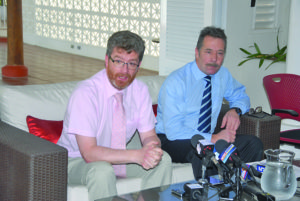By Jarryl Bryan
With questions raised about the Special Organised Crime Unit’s (SOCU) effectiveness in bringing successful cases against those it is pursuing, British white-collar crime expert Sam Sittlington has revealed that SOCU is inundated with forensic audits. Despite this, however, some of his proposals to lighten the workload are not being implemented.

Sittlington made this revelation during a press conference hosted by the British High Commissioner, Gregory Quinn, on Tuesday, officially announcing his return. The Advisor, who had worked with SOCU last year in a similar capacity, lamented that recommendations like hiring in-house legal counsel for SOCU and special prosecutors to assist the Police Legal Advisor (PLA) are languishing in much the same way as some of the cases he left.
“I do not make decisions on behalf of SOCU,” Sittlington related. “(But) there’s a number of recommendations I made last year, which although approved, have not yet been implemented. The five special prosecutors that we have also have private practices so they are conflicted between two different areas.”
“Ideally, we want one good lawyer in SOCU who can work with the cases … they can finalise a case before it goes to PLA (Police Legal Advisor) or DPP [Director of Public Prosecution] to try to quicken that actual process of getting that case to court,” Sittlington noted.
The Advisor also noted that conflict sometimes arises between the PLA, the DPP and the special prosecutors. At the end of it all, Sittlington acknowledged that undue delays were unfair to those being investigated from a human rights perspective.
He noted that he could meet with these individuals and institutions, in order to mediate a way forward. Asked point blank whether PLA, Justice Claudette Singh, was being reluctant in pursuing cases, Sittlington expressed disagreement.
Sittlington pointed out that with only four forensic audits resulting in court charges, SOCU presently has to deal with 26 forensic audits that could result in over 300 cases. Of these, he said, an estimated G$170 billion could be at stake. In addition, Sittlington revealed that SOCU is handling a number of referrals from the Financial Intelligence Unit (FIU).
Ramifications
Quinn, who accompanied Sittlington during the press conference, explained the ramifications for Guyana seeming soft on money laundering cases. According to Quinn, the United Kingdom while providing assistance to the Government could not do everything.
“All we can do here is providing guidance, mentoring to a fundamental part of Guyana’s ability to be anti-money laundering and countering the financing of terrorism,” Quinn explained, noting that this is something everyone should be concerned about.
“Because if Guyana is not seen to be addressing (money laundering), that has (a) potentially significant broader impact to Guyana’s standings globally, not just in the financial market, but also as to how other countries around the world see Guyana,” Quinn related.
In a previous interview with Guyana Times International in September of last year, SOCU head, Assistant Commissioner of Police Sydney James, had made mention of cases being delayed. He had revealed that since being handed over 20 forensic audit reports, the Unit had managed to complete investigations into three of these matters.
Those matters were their investigations into Pradoville 2, the National Industrial and Commercial Investment Limited (NICIL) and the Commonwealth Reports for which former Attorney General Anil Nandlall was charged.
James had noted that SOCU’s other investigations were still a work in progress. He had revealed that in some cases they were awaiting legal advice. Pressed on the delay, James questioned whether he had the authority to find out reasons for the delay from the Police Force’s Legal Advisor.
Following Sittlington’s initial appointment last year, SOCU in a bold move had arrested and questioned a number of top officials from the previous Government. These arrests were in connection to property purchased at the Sparendaam seawall area on the East Coast that is commonly known as “Pradoville 2”.
While the current Administration contends that the transaction is a criminal act because of the belief that the land was sold below market value, the People’s Progressive Party (PPP) had argued that subsidized housing has always been a part of the legacy of the People’s Progressive Party, and that countless Guyanese have benefited from lands sold below market value. No further action was ever pursued against these former officials and the arrests prompted resounding cries of ‘witch-hunting’.



